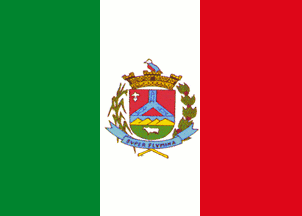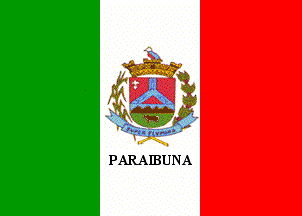 image by Dirk Schönberger,
27 December 2012
image by Dirk Schönberger,
27 December 2012Based on: http://pt.wikipedia.org/wiki/Paraibuna

FOTW beschäftigt sich mit der Wissenschaft der Vexillologie (Flaggenkunde).
Alle auf dieser Website dargebotenen Abbildungen dienen ausschließlich der Informationsvermittlung im Sinne der Flaggenkunde.
Wir distanziert uns ausdrücklich von allen hierauf dargestellten Symbolen verfassungsfeindlicher Organisationen.
Last modified: 2013-03-02 by ian macdonald
Keywords: sao paulo | paraibuna |
Links: FOTW homepage |
search |
disclaimer and copyright |
write us |
mirrors
 image by Dirk Schönberger,
27 December 2012
image by Dirk Schönberger,
27 December 2012
Based on:
http://pt.wikipedia.org/wiki/Paraibuna
A vertical tricolour, green-white-red with the municipal arms in the centre.
Official website at
http://www.paraibuna.sp.gov.br/
Dirk Schönberger,
27 December 2012
Parabuina was established as a chapel built on a 13 June; accordingly, the chapel was dedicated to the saint of that day, St. Anthony. Francisco Campos ("Almanaque", 1909) gives 13 June 1666 as the day of foundation, while Netto Caldeira ("História de Paraibuna", 1932) gives the year of foundation as "around 1700". Since there is no written source on this event, the official day of foundation of Parabuina was officially fixed as 13 June 1666 (which allows the town to claim to be "among the oldest towns of the country"). The villages that developed near the chapel was named Santo Antônio da Barra de Paraibuna, "barra" meaning "a confluence". On 3 June 1773, Luiz Antônio de Souza, Captain General of São Paulo, appointed Manoel Antônio de Carvalho as the administrator of the settlement. He also ordered "lost and homeless people, as well as those useless to the Republic" to go to Paraibuna. Under the pressure of the inhabitants, the order was cancelled in 1775, when the town of Parabuina was transferred to João Simões Tavares, Manuel Garcia Rosa, Manuel Motta and José Pereira. The municipality of Santo Antônio de Paraibuna was established on 10 July 1832.
The symbols of Paraibuna are prescribed in Article 5 of the Municipal Constitution, adopted on 2 April 1990, as "the flag, the coat of arms and the anthem, established by Municipal Law". Article 6 prescribes the official colours of the municipality as "green, white and red".
http://www.cmparaibuna.sp.gov.br/docs/lei_organica.pdf - Municipal Constitution
A vertical tricolour, green-white-red with the municipal arms in the centre.
TThe flag hoisted in the Town Hall has the writing "Paraibuna" beneath the shield.
http://www.cmparaibuna.sp.gov.br/noticia.php?Id=119 - Photo of the flag
The coat of arms is "A classic Portuguese shield, per fess, 1. Gules a pall azure charged with three "iabanhas" argent a fleur-de-lis of the same in canton, 2. Azure four mounds or a base vert a bull argent. The shield surmounted by a four-towered mural crown or ensigned with a kingfisher proper. The shield supported dexter by a sugarcane and sinister by a branch of coffee fructed the two proper. Beneath the shield a scroll azure charged with the motto 'SVPER FLVMINA."
TThe fleur-de-lis is the attribute of St. Anthony, the town's patron saint. The pall represents the formation of river Paraíba by the confluence of rivers Paraibuna and Paraitinga, located close to the seat of the municipality. The three "piabanhas" represent a local fish species of great significance. The lower part of the shield represents a typical local landscape, under a sky always blue. The four hills, located on the border with the municipality of Jambeiro, recall the place where the pioneers from Taubaté left river Paraíba on 13 June 1666 to found the town. The bull represents a recent but important source of income, cattle breeding.
http://www.valedoparaiba.com/cidadesdaregiao/?pagina=cidade&cidade=Paraibuna&menu=937 - "Enciclopédia VP" wesbite
Célio de Abreu gives more specific, additional details on the arms. Gules represents the blood shed in the battles fought between the Tamoio, Tamuya and Tamujo natives, and the Portuguese colonists. The "piabanha" is known under the Latin binomial Brycon insignis [B. insignis Steindachner, family Characidae, is endemic to river Paraíba do Sul.] Paraibuna was a main coffee producer in the 19th century. As far as sugarcane is concerned, there is little information on local production, except a sugar mill recorded in 1836. The Latin motto means "Above the River". However, due to an increase in the level of the rivers in the late 1970s, Paraibuna is no longer "above" the water.
http://parahybvna-svper-flvmina.blogspot.fr/2009/01/paraibuna-rios-acima.html - "Parahybvna svper flvmina" blog, 17 January 2009
This version of the coat of arms, shown on the website of the Municipal Council, slightly differ from the (original?) version described and shown on the Paraibuna portal. Here, the pall is argent, the hills are dark green, the scroll is argent and "PARAIBUNA" is written in letters sable beneath the scroll.
http://www.paraibunasp.com.br/index.php?urlid=dados_gerais
The flag hoisted in the Town Hall appears to mix the two versions of the coat of arms, using the "most recent" shield - with brown hills and bull with the writing "Paraibuna" beneath it.
http://www.cmparaibuna.sp.gov.br/noticia.php?Id=119 - Photo of the flag
- Flag used in the Town Hall
Ivan Sache, 3 February 2013
 image by Ivan Sache,
3 February 2013
image by Ivan Sache,
3 February 2013
A variant of this flag as used in the town hall (http://www.cmparaibuna.sp.gov.br/noticia.php?Id=119)
contains the name below the arms.
Ivan Sache, 3 February 2013
Hosted by: Fanshop-Online.de und Handy-Shop.de
Tipp: Apple iPhone XS MAX